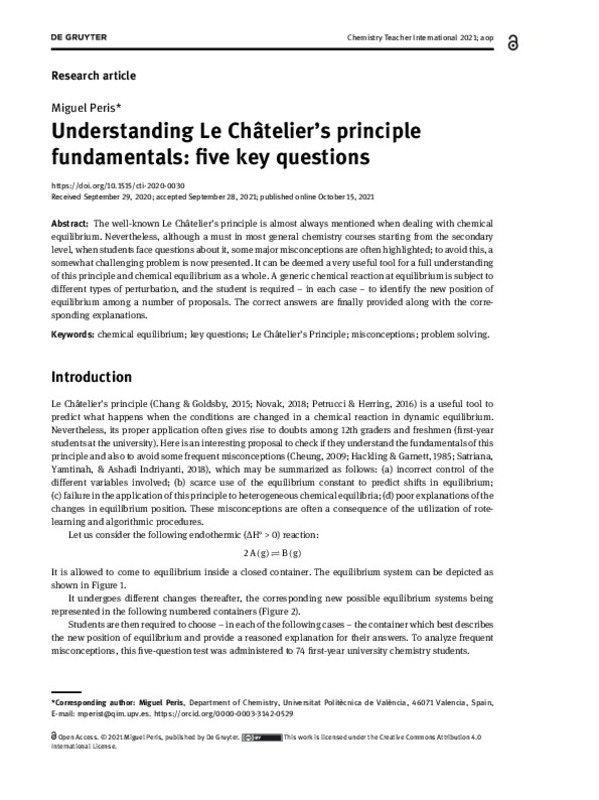JavaScript is disabled for your browser. Some features of this site may not work without it.
Buscar en RiuNet
Listar
Mi cuenta
Estadísticas
Ayuda RiuNet
Admin. UPV
Understanding Le Châtelier's principle fundamentals: five key questions
Mostrar el registro sencillo del ítem
Ficheros en el ítem
| dc.contributor.author | Peris Tortajada, Miguel
|
es_ES |
| dc.date.accessioned | 2021-11-05T14:10:35Z | |
| dc.date.available | 2021-11-05T14:10:35Z | |
| dc.date.issued | 2021-10-15 | es_ES |
| dc.identifier.uri | http://hdl.handle.net/10251/176421 | |
| dc.description.abstract | [EN] The well-known Le Châtelier's principle is almost always mentioned when dealing with chemical equilibrium. Nevertheless, although a must in most general chemistry courses starting from the secondary level, when students face questions about it, some major misconceptions are often highlighted; to avoid this, a somewhat challenging problem is now presented. It can be deemed a very useful tool for a full understanding of this principle and chemical equilibrium as a whole. A generic chemical reaction at equilibrium is subject to different types of perturbation, and the student is required ¿ in each case ¿ to identify the new position of equilibrium among a number of proposals. The correct answers are finally provided along with the corresponding explanations. | es_ES |
| dc.language | Inglés | es_ES |
| dc.publisher | De Gruyter | es_ES |
| dc.relation.ispartof | Chemistry Teacher International | es_ES |
| dc.rights | Reconocimiento (by) | es_ES |
| dc.subject | Chemical equilibrium | es_ES |
| dc.subject | Key questions | es_ES |
| dc.subject | Le Châtelier's Principle | es_ES |
| dc.subject | Misconceptions | es_ES |
| dc.subject | Problem solving | es_ES |
| dc.subject.classification | QUIMICA ANALITICA | es_ES |
| dc.title | Understanding Le Châtelier's principle fundamentals: five key questions | es_ES |
| dc.type | Artículo | es_ES |
| dc.identifier.doi | 10.1515/cti-2020-0030 | es_ES |
| dc.rights.accessRights | Abierto | es_ES |
| dc.contributor.affiliation | Universitat Politècnica de València. Departamento de Química - Departament de Química | es_ES |
| dc.description.bibliographicCitation | Peris Tortajada, M. (2021). Understanding Le Châtelier's principle fundamentals: five key questions. Chemistry Teacher International. 1-3. https://doi.org/10.1515/cti-2020-0030 | es_ES |
| dc.description.accrualMethod | S | es_ES |
| dc.relation.publisherversion | https://doi.org/10.1515/cti-2020-0030 | es_ES |
| dc.description.upvformatpinicio | 1 | es_ES |
| dc.description.upvformatpfin | 3 | es_ES |
| dc.type.version | info:eu-repo/semantics/publishedVersion | es_ES |
| dc.identifier.eissn | 2569-3263 | es_ES |
| dc.relation.pasarela | S\447477 | es_ES |
| dc.description.references | Chang, R., & Goldsby, K. (2015). Chemistry (12th ed.). New York, U.S.A.: McGraw-Hill Education. | es_ES |
| dc.description.references | Cheung, D. (2009). The adverse effects of Le Châtelier’s principle on teacher understanding of chemical equilibrium. Journal of Chemical Education, 86, 514. https://doi.org/10.1021/ed086p514. | es_ES |
| dc.description.references | Hackling, M. W., & Garnett, P. J. (1985). Misconceptions of chemical equilibrium. European Journal of Science Education, 7, 205–214. https://doi.org/10.1080/0140528850070211. | es_ES |
| dc.description.references | Novak, I. (2018). Geometrical description of chemical equilibrium and Le Châtelier’s principle: two-component systems. Journal of Chemical Education, 95, 84–87. https://doi.org/10.1021/acs.jchemed.7b00665. | es_ES |
| dc.description.references | Petrucci, R. H., & Herring, F. G. (2016). General chemistry: principles and modern applications (11th ed.). London, U.K.: Pearson PLC. | es_ES |
| dc.description.references | Satriana, T., Yamtinah, S., Ashadi, A., & Indriyanti, N.Y. (2018). Student’s profile of misconception in chemical equilibrium. In IOP Conf. Series: Journal of Physics: Conf. Series (1097, pp. 012066–012073). Bristol, U.K.: IOP Publishing Ltd, 012066. | es_ES |








